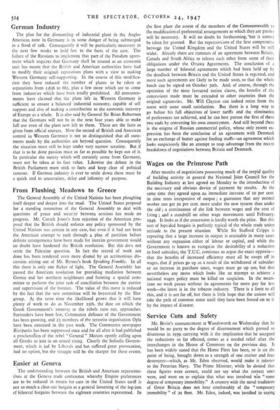Easier at Geneva
The understanding between the British and American representa- tives at the Geneva trade conference whereby Empire preferences are to be reduced in return for cuts in the United States tariff is not so much a clear-cut bargain as a general loosening of the log-jam of bilateral bargains between the eighteen countries represented. In the first place the assent of the members of the Commonwealth to the modification of preferential arrangements to which they are parties will be necessary. It will no 'doubt be forthcoming, *but it cannot be taken for granted. But the repercussions of the first compromise betwsn the United Kingdom and the United States will be still wider. Already there are rumours of an agreement between Britain, Canada and South Africa to release each other from some of their obligations under the Ottawa Agreements. The conclusion of a large number of bilateral agreements which had been held up by the deadlock between Britain and the United States is reported, and more such agreements are likely to be made soon, so that the whole batch can be signed on October 3oth. And, of course, through the operation of the most favoured nation clause, the benefits of the concessions made must be extended to other countries than the original signatories. Mr. Will Clayton can indeed retire from the scene with some small satisfaction. But there is a long way to go before his full objectives of lower tariffs and the elimination of preferences are achieved, and he can best pursue the first of these two ends by converting his own countrymen. And still beyond there is the enigma of Russian commercial .policy, whose oily recent ex- pression has been the conclusion of an agreement with Denmark for an exchange of butter against feeding stuffs—an agreement which looks suspiciously like an attempt to reap advantage from the recent breakdown of negotiations between Britain and Denmark.
































 Previous page
Previous page